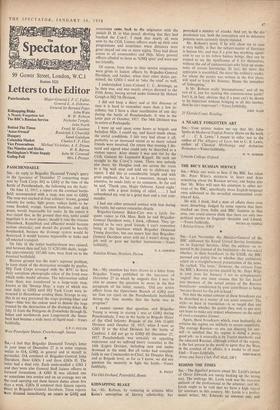feel that Brigadier Desmond Young's letter in your issue of
December 27 is in some respects Unfair to OA, GHQ, in general and to myself in Particular. OA consisted of Brigadier-General John Davidson, three GSOs I and three GSOs II. The latter had a dual role. Each understudied a GS0 I and they‘ were also General Staff liaison officers to forward formations. A GS0 II was allotted one or sometimes two armies and on an average was on the road carrying out these liaison duties about five days a week. GSOs II rendered their liaison reports direct to Brigadier-General Davidson. These reports Were dictated immediately on return to GHQ and
sometimes came back to the originator with the initials D. H. in blue pencil, showing that they had 'reached the C-in-C. I think that nearly all were seen by the CGS. Liaison officers made up their own programmes and sometimes when distances were great stayed out one or more nights. They had direct access to all commanders and HQs. Many general officers alluded to them as 'GHQ spies' and were not too friendly.
Of course, from time to time special assignments were given to liaison officers by Brigadier-General Davidson, and further, when their other duties per- mitted, the GSOs I used to 'take the road' as well.
I understudied Lieut.-Colonel C. C. Armitage, as he then was, and was nearly always directed to the Fifth Army, having served under General Sir Hubert Gough at HQ 7th Division.
I did not keep a diary and at this distance of time it is hard to remember more than a few in- cidents; but I have a clear recollection of one day during the battle of Passchendacle. It was in the latter part of October, 1917. The 34th Division was in action at Poelcapelle.
I went up and spent some hours at brigade and battalion HQs. I could see, and heard much about, the awful conditions. I felt very bad about it all, probably to an increased extent as so many valued friends were involved. On return that evening I dic- tated and signed what could only be described as a violent report. After dinner I was sent for by the CGS, General Sir Launcelot Kiggell. He took me straight to the C-in-C's room. There was nobody else there. Sir Douglas took me across the room to a big wall map and told me to elaborate my report. I -did this at considerable length and with great emphasis. As far as I remember, though -very attentive, he made little or no comment. At the end he said, 'Thank you, Major Osborne. Good night.'
I left with a great feeling of relief. . . . I had unburdened my soul to a great man and a real com- mander.
I had one other personal contact with him during this battle, but cannot remember details.
Brigadier-General Baker-Carr was a fairly fre- quent visitor to OA Mess. Both he and Brigadier- General Davidson were, I think, riflemen. They ap- peared to be very good friends. I can't remember being at the luncheon which Brigadier Desmond Young describes, but can assure him that Brigadier- General Davidson never told mc I wasn't doing my job well or gave me further instructions.—Yours faithfully,


































 Previous page
Previous page